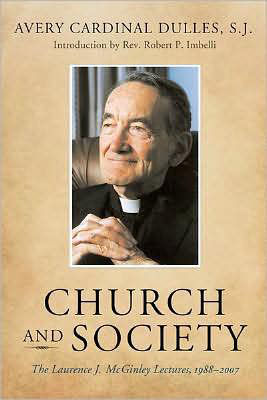
|
Posted April 15, 2008
Book: Church and Society: Avery Cardinal Dulles The Laurence J. McGinley Lectures 1988-2007 Introduction by Rev. Robert P. Imbelli Fordham University Press. New York. 2008. Pp. 534 An Excerpt from the Jacket:
Here, brought together for the first time in one volume, are the talks Cardinal Dulles has given twice each year since the Laurence J. McGinley Lectures were initiated in 1988, conceived broadly as a forum on Church and society. The result is a diverse collection that reflects the breath of his thinking and engages with many of the most important — and difficult — religious issues of our day. Organized chronologically, the lectures are often responses to timely issues, such as the relationship between religion and politics, a topic he treated in the last weeks of the presidential campaign of 1992. Other lectures take up questions surrounding human rights, faith and evolution, forgiveness, the death penalty, the doctrine of religious freedom, the population of hell, and a whole array of theological subjects, many of which intersect with culture and politics. An Excerpt from the Book: Meaning of the “New Evangelization” Drawing on scattered statements in different documents one may attempt a synoptic overview of what the pope seemed to have in mind by the “new evangelization.” it is new, in part, because it is occasioned by forthcoming commemoration of Christopher Columbus and, eight years later, the jubilee of the Incarnation. Grateful for the achievements of the past, the new evangelization must avoid denigrating the work of the early missionaries or judging them by the behavioral standards of our own day. No matter how well others did for their own age, the new evangelization cannot be a mere return to the missionary tactics of a former era. The persuasive heralding of the gospel message today requires a new quality of evangelization and methods attuned to the sensibility of our times. This adaptation is clearly implied in the idea of “new evangelization.” John Paul II sees the new evangelization as having a deeply theological motivation. It rests on a recognition that the living Christ is, through the Holy Spirit, the chief agent. To be effective bearers of the gospel, ministers of the Church must have a close personal relationship to the Lord. “Missionary dynamism,” according to John Paul II, “is not born of the will of those who decide to become propagators of their faith. It is born of the Spirit, who moves the Church to expand, and it progresses through faith in God’s love.” the new evangelization, he says, “is not a matter of merely passing on doctrine but rather of a personal and profound meeting with the Savior.” Although the name of Jesus Christ must be explicitly proclaimed, evangelization can never be a matter of words alone. “The witness of a Christian life is the first and irreplaceable form of mission.” Before we can pass on the gospel to others, it must first have permeated our own lives. “It is important to recall that evangelization involves conversion, that is, interior change.” It must emanate from a deep experience of God. Animated by Christ and the Holy Spirit, the new evangelization is for that very reason a work of the Church. It “is the witness which the Son of Man bears to himself, perpetuated in the mission of the Church,” which is sent by Christ to evangelize. Looking on the Church as the corporate evangelizing subject, John Paul II insists that the effort must be borne by the entire membership, clerical, religious, and lay. Members of the Church act not as isolated individuals but in communion with the whole Church and in subordination to the bishops and the Holy See. Table of Contents: 1. University theology as a service to the church 2. Teaching authority in the church 3. Catholicism and American culture: the uneasy dialogue 4. Faith and experience: strangers? Rivals? Partners? 5. Newman, conversion and ecumenism 6. The uses of scripture in theology 7. John Paul II and the new evangelization 8. Historical method and the reality of Christ 9. Religion and the transformation of politics 10. The church as communion 11. The prophetic humanism of John Paul II 12. The challenge of the catechism 13. Crucified for our sake 14. John Paul II and the advent of the new millennium 15. Priesthood and gender 16. The travails of dialogue 17. The Ignatian tradition and contemporary theology 18. Mary at the dawn of the new millennium 19. Should the church repent 20. Human rights: the United Nations and Papal teaching 21. Can philosophy be Christian? The new state of the question 22. Justification today: a new ecumenical breakthrough 23. The papacy for a global church 24. The death penalty: a right-to-life issue? 25. Religious freedom: a developing doctrine 26. Christ among the religions 27. When to forgive 28. The population of Hell 29. True and false reform in the church 30. John Paul II and the mystery of the human person 31. The rebirth of apologetics 32. A Eucharistic church: the vision of John Paul II 33. How real is the real Presence? 34. Pope Benedict XVI: interpreter of Vatican II 35. The mission of the laity 36. The Ignatian charism at the dawn of the twenty-first century 37. Evolution: atheism, and religious belief 38. Who can be saved? |
|
